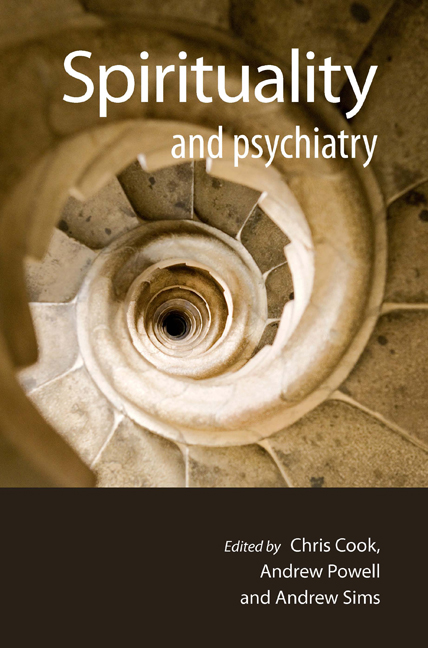Book contents
- Frontmatter
- Contents
- List of contributors
- List of tables, boxes and figures
- Foreword
- Preface
- The Spirituality and Psychiatry Special Interest Group of the Royal College of Psychiatrists
- 1 Spirituality in psychiatry
- 2 Assessing spiritual needs
- 3 Psychosis
- 4 Suicide
- 5 Child and adolescent psychiatry
- 6 Psychotherapy
- 7 Intellectual disability
- 8 Substance misuse
- 9 Neuroscience of the spirit
- 10 Spiritual care in the NHS
- 11 The transpersonal perspective
- 12 Religion and religious experiences
- 13 Pathological spirituality
- 14 Ageing
- Index
14 - Ageing
- Frontmatter
- Contents
- List of contributors
- List of tables, boxes and figures
- Foreword
- Preface
- The Spirituality and Psychiatry Special Interest Group of the Royal College of Psychiatrists
- 1 Spirituality in psychiatry
- 2 Assessing spiritual needs
- 3 Psychosis
- 4 Suicide
- 5 Child and adolescent psychiatry
- 6 Psychotherapy
- 7 Intellectual disability
- 8 Substance misuse
- 9 Neuroscience of the spirit
- 10 Spiritual care in the NHS
- 11 The transpersonal perspective
- 12 Religion and religious experiences
- 13 Pathological spirituality
- 14 Ageing
- Index
Summary
For the suffering individual … what he makes of his suffering – whether it becomes a triumph or a tragedy of the human spirit, whether hope gains, or despair – matters, not just to himself, but to the creation itself … Whatever anyone may think then, the response of the suffering individual matters: he is not powerless. But his power is not apparent: its true measure is relative not to the achievement of others, but to the suffering individual's own condition [Boyd, 2000: p. 88].
Old age psychiatry is a discipline of particular ‘confluence’, where medical and psychological sciences meet in more integrated and interrelated presentations than at any other time in a patient's life. Pathology increases and psychopathology becomes more frequent, the latter being brought about by the substantial occurrence of dementia or functional illness, or both. The social profile of an older person can be marked by the accumulation of progressive losses in social meaning and networks. For example, their relationship with family members and friends may undergo significant changes as a result of relocation to supported accommodation or residential and nursing facilities. The challenge of a personal journey into degrees of fragility and isolation creates fertile ground for increased vulnerability and the generation of specific needs, related to mental, emotional, spiritual and physical well-being. The relevance of a multidimensional and holistic approach therefore becomes paramount in the teaching and training of old age psychiatrists.
It appears that in the assessment of the older person insufficient attention has been paid to core aspects of the personality, which can convey important information on coping skills and how they influence responses to treatment, and thus overall outcome. Deep among these lie the root constructs of a person's vision of life and personal meanings, and the presence of a spiritual core. This may or may not be accompanied by formal religious adherence and integration into a faith community.
The scope of this chapter is to review the ageing process and the emerging psychopathologies of old age psychiatry, the role of spirituality in ageing and the diverse ways in which individuals approach the transition to later life. In addition, we consider an approach that goes beyond standard medical practice.
- Type
- Chapter
- Information
- Spirituality and Psychiatry , pp. 273 - 294Publisher: Royal College of PsychiatristsPrint publication year: 2009



